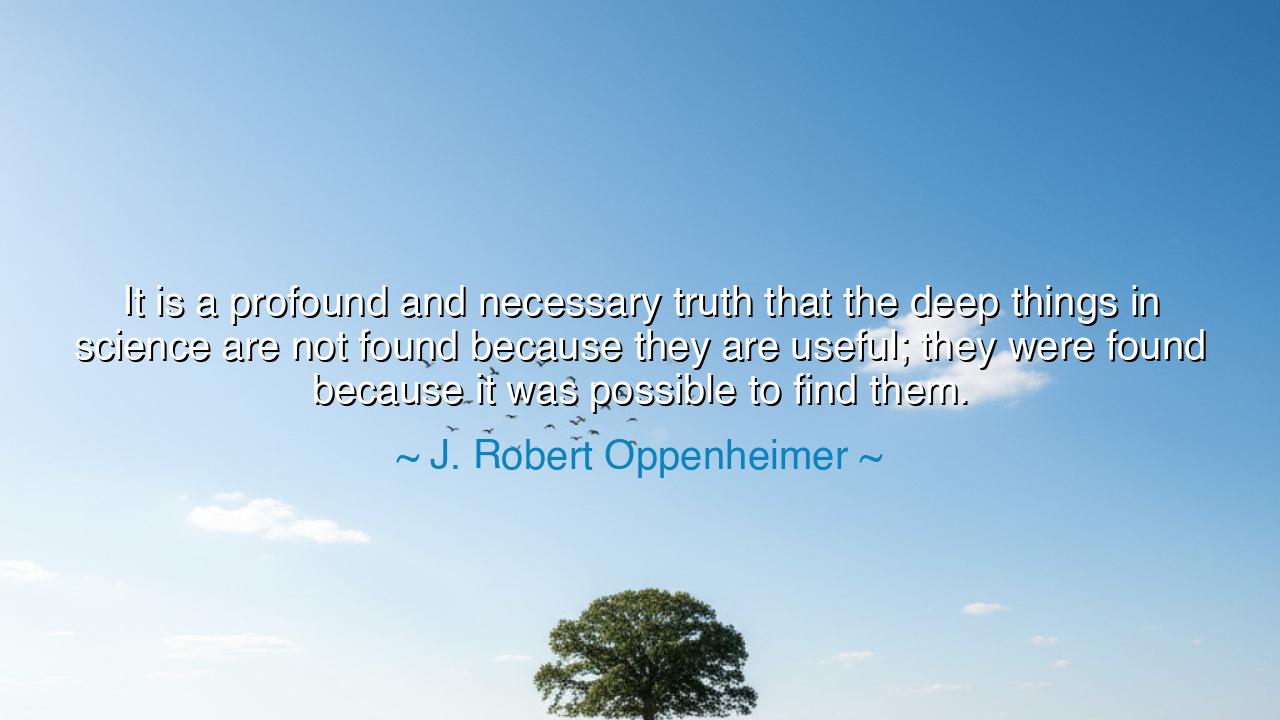
It is a profound and necessary truth that the deep things in
It is a profound and necessary truth that the deep things in science are not found because they are useful; they were found because it was possible to find them.






"It is a profound and necessary truth that the deep things in science are not found because they are useful; they were found because it was possible to find them." These words, spoken by J. Robert Oppenheimer, ring through the halls of intellectual history, echoing with the wisdom of those who have ventured to uncover the deepest secrets of the universe. In them, Oppenheimer speaks to a profound truth: the greatest discoveries in science are not driven by immediate usefulness, but by the innate curiosity of the human spirit and the boundless possibility of exploration. The truths that shape our world—whether in the realms of physics, chemistry, or astronomy—are not born from the desire to solve a problem, but from the simple fact that we, as humans, can ask the question, and, in the asking, open the door to deeper understanding.
In the ancient world, great minds like Aristotle, Plato, and Pythagoras sought to understand the mysteries of the universe not because they sought to harness knowledge for immediate gain, but because they were driven by an unquenchable thirst for understanding. They recognized that the true value of knowledge lay not in its practical applications, but in the ability to seek the unknown and to explore the limits of what was possible. It was through this boundless curiosity that they discovered the relationships between the stars, the nature of matter, and the very fabric of existence. They sought to understand the world not for its usefulness, but for the sheer wonder of what might be revealed.
Consider the great work of Isaac Newton, whose discovery of the laws of motion and gravity changed the course of human history. Did Newton know, when he first set his mind to understanding why an apple falls from a tree, that his insights would lead to the creation of modern physics, or to the exploration of space itself? No, he sought only to understand, to explore the possibilities of the universe. His laws were not born out of a desire to create machines, to build empires, or to solve any immediate problem, but from a deep, intrinsic drive to comprehend the forces that govern the heavens and the earth. Science, in its most pure form, is not a tool for solving the problems we know we face, but a pathway to discovering what is possible, what lies beyond the horizon of our understanding.
This truth is echoed in the development of the atomic bomb by Oppenheimer and his colleagues during the Manhattan Project. When the splitting of the atom was first discovered, it was not driven by the intention to create weapons of mass destruction, but by the realization that the very building blocks of matter—atoms—held untold potential. The pursuit of this knowledge was driven by a desire to understand the universe, to unlock the mysteries of the forces that govern all of creation. It was, in its essence, a quest for truth, an exploration of the unknown. The usefulness of this discovery—its devastating application in warfare—was an unintended consequence of human curiosity, a byproduct of the relentless pursuit of knowledge that Oppenheimer himself would later wrestle with.
In this, Oppenheimer’s words stand as a warning and a reflection. The deep things in science are often not sought for their immediate utility, but for the very possibility of their existence. The question that drives scientists, then, is not “What can we use this for?” but “What is this?” It is the search for understanding that gives science its power. And in that search, we must be wary, for the consequences of our discoveries may not always align with our intentions. But despite this, Oppenheimer’s quote invites us to celebrate the pursuit of knowledge itself, for it is through this pursuit that we are drawn ever forward, toward greater truths, toward greater understanding.
The lesson we can take from Oppenheimer’s words is this: that knowledge, in its purest form, is not about solving problems—it is about exploration and discovery. The most important truths are often found not because they are useful, but because they are possible to find. It is the very act of seeking that leads us to the revelations that shape our world. In our own lives, we must not focus solely on what we can use knowledge for, but on the value of seeking the unknown. Whether in our personal endeavors, our careers, or in our relationships, we should approach the world with a spirit of curiosity, ready to explore the possibilities that exist beyond our current understanding.
And so, as we venture into the future, let us carry with us the wisdom of Oppenheimer and the great thinkers who came before him. Let us seek not only for the useful and the practical, but for the unknown, for the mysteries that remain hidden. For in seeking to understand the world—not for the purpose of using it, but simply for the joy of discovering what is possible—we find that we are not only unlocking the secrets of the universe but also growing as individuals, as societies, and as a species. The journey of discovery is its own reward, and it is this journey that makes the human spirit truly immortal.






AAdministratorAdministrator
Welcome, honored guests. Please leave a comment, we will respond soon